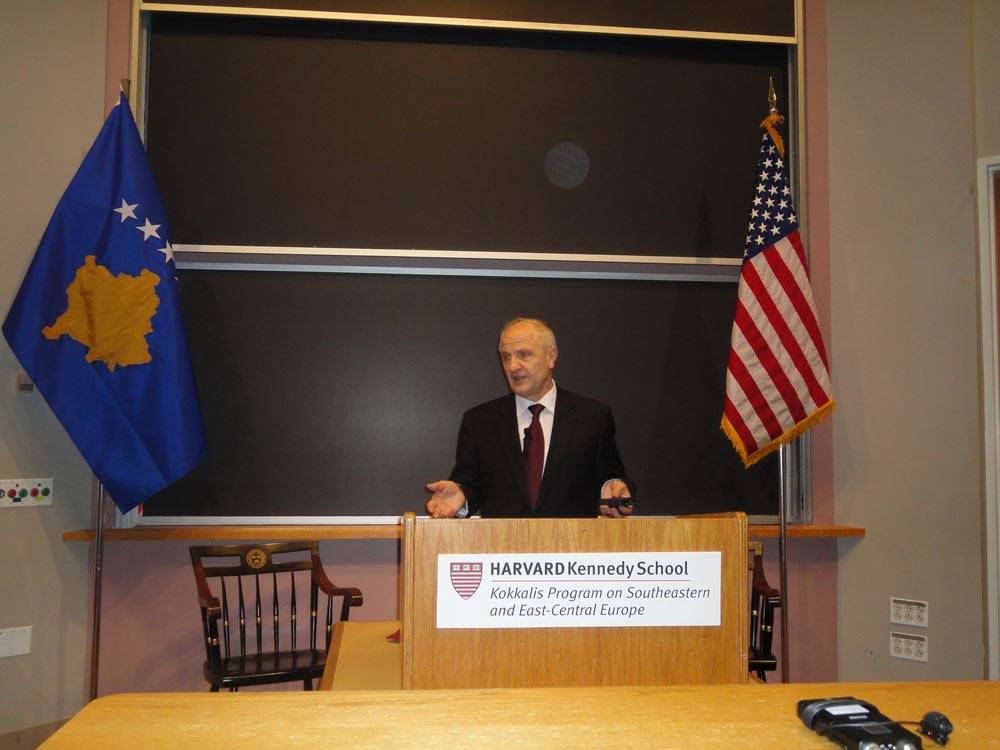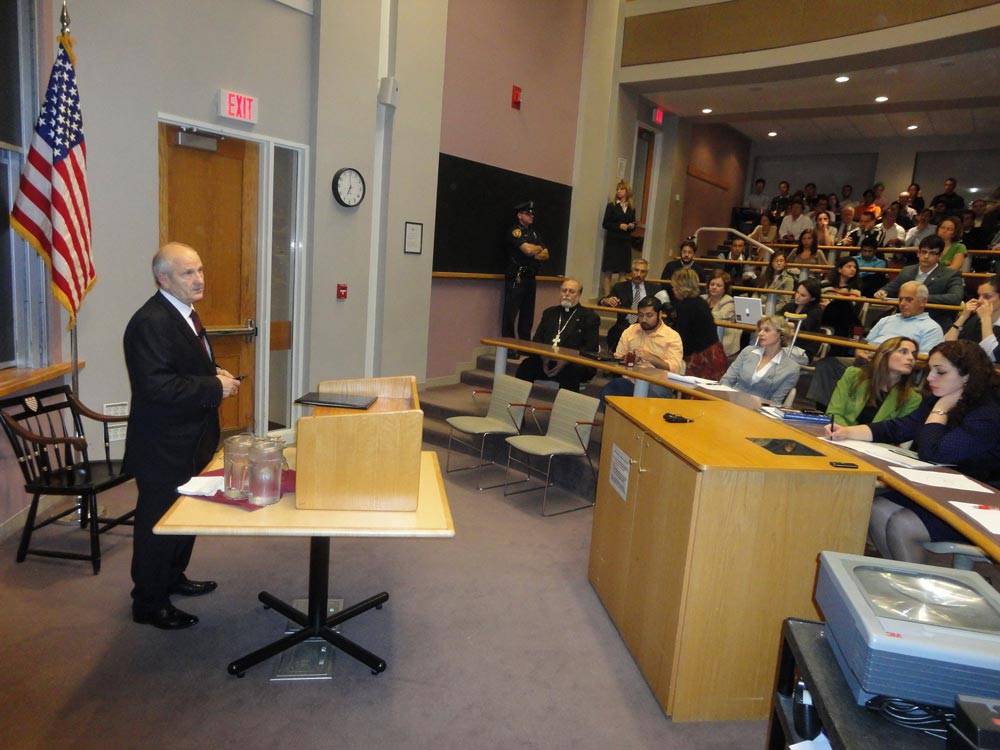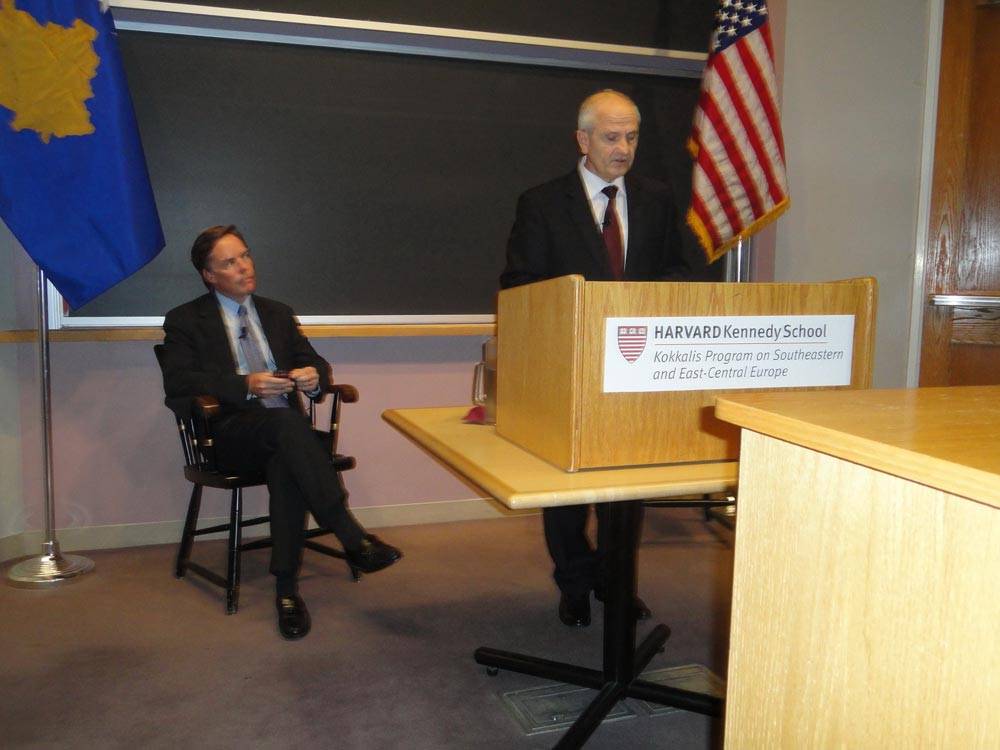Dear friend, Mr. Nicholas Burns, allow me to express the respect and the appreciation of my people and I for your deep and constant determination for the freedom and independence of Kosovo.
Honorable colleagues, professors and students, Dear friends,
As President of Republic of Kosovo, I feel privileged to be appearing
here before such a respectable audience, at this very prestigious
institution, which, owing to scientific researches that it has carried
out and numerous generations of students that it has taught, has left
multidimensional traces which are impossible to hide.
Moreover, today I have the pleasure of providing you with a short
overview of the progress made by my country, the youngest state in the
world, the Republic of Kosovo, and of its objectives for the future,
near the historic city of Boston, which is known as the genesis of the
great processes for the freedom and the independence of the United
States.
As you know, Kosovo has won its independence on 17 February 2008,
following century-long sufferings and sacrifices. The independence of
Kosovo was declared in full coordination with the United States of
America, the countries of the European Union and other world’s
democracies.
The independence of Kosovo has resulted from a comprehensive centuries
long resistance staged against a systematic oppression that was being
exerted upon its people, which culminated with an unseen brutality,
particularly by the end of the 20th century, with Milosevic’s advent to
power, which imposed an eventual armed resistance by the people of
Kosovo and of the determinant intervention by NATO, which brought the
ethnic cleansing to an end and delivered the people of Kosovo from
annihilation.
The sovereign and democratic state of Kosovo has been recognized by 70 countries around the world so far.
In this context, besides the United States of America, which was among
the first to announce the recognition, Kosovo has been recognized by
over three-thirds of the EU member countries, most of the OSCE member
countries and the vast majority of the NATO member countries, namely by
countries that together produce more than 70% of the global nominal GDP.
Dear friends,
Irrespective of all the challenges that we have had and are still
facing as a young country, the Republic of Kosovo has become a story of
success of a vast investment by the people of Kosovo and international
community, especially by the United States of America and the European
Union.
Firstly, an overall political, economic and social sustainability and
stability constitute the best and most direct indication to such a
success of the independence of Kosovo. The success has been manifested
particularly in the completion of a cycle that has consisted of the
creation of our state and the establishment of democratic institutions,
which have emerged from the free votes of the people of Kosovo,
irrespective of ethnicity. The work of these institutions is based now
on a modern legal framework, including the highest legal document, the
Constitution of our country.
Secondly, with the aim of building a democratic state for all the
people, Kosova has, in practical terms, proven wrong all the ominous
prognoses of opponents of independence. In their efforts, they had
been continuously launching dark predictions, mainly accusing the
Albanian majority of intent to commit acts of revenge upon the Serbian
minority. To the contrary, there was no exodus from Kosovo, or a
backlash, or a persecution against minority communities or the Serbian
community, in particular. Rather, our institutions have adopted a most
positive approach in providing for a civic equality, in paying a
particular attention to the process of minority integration and in
providing substantive legislative and constitutional guarantees, in the
light of the provisions of President Ahtisaari’s Comprehensive
Proposal. By these practical and affirmative legal documents and acts,
which are often perceived in Kosovo as acts of positive discrimination,
we have provided strong proof not only of minority representation in
our institutions – like in the Assembly, in the Government and in the
Local Government – but we have also tried to make sure that minority
community members embrace Kosovo as a joint homeland and feel equal and
beneficial to their own and our common perspective.
Thirdly, being strongly committed to peace, stability and
neighborliness in the region, the Republic of Kosovo maintains
excellent relations with its neighboring countries: Macedonia, Albania
and Montenegro, as well as other countries of the region.
These relations are being cemented day by day in terms of bilateral
agreements on many fields. We have already started to apply a
passport-free movement policy with Albania and Montenegro and a similar
agreement with Macedonia is due, as a sign of closeness and security
between the citizens of our two countries.
In this vein, as early as two years ago, during a visit to Tirana, I
proposed the creation of a mini Schengen zone between Balkan countries.
The initiative, which presidents of these countries have hailed,
reaffirms our strong commitment to be open and to contribute directly
to the freedom of movement of people and goods, because this is where
the foundation of our development and progress towards the future lies,
as well as serving as a direct proof of our maturity in our
Euro-Atlantic integration efforts.
Fourthly, despite a period of devastation and its terrible aftermath,
human toll (more than 15,000 killed – today, the fate of over 2000
missing people is unknown) and destruction of economic potentials,
Kosovo has started to recover since the end of the war and up to the
recent years that have followed our independence. It has undertaken
major steps in transforming its economy, in line with the trends of the
market economy. I would like to point out that Kosovo has almost
completed the privatization process and it has achieved a constant
growth of 4-5% in its annual GDP. Kosovo has shown maturity with
regard to respecting and implementing modern policies of market
economics and as a result has become a member of the World Bank group
and the International Monetary Fund, and aspires quick membership in
other international mechanisms.
Honored Audience,
Despite such an approach adopted by the institutions of our country and
despite the international support and investment, the reluctance of
some members of the Serbian community to integrate themselves has
represented a challenge so far. Indeed, through parallel structures at
Belgrade’s conduct, they have tried to promote policies that have aimed
at hampering a progress in Kosovo and at keeping, first of all, the
Serbian population under pressure.
In this very context, the Serbian diplomacy has also tried to block a
further international recognition of the Republic of Kosovo and its
accession to international institutions. The request that it has filed
with the International Court of Justice for an advisory opinion on the
legality of declaration of independence of Kosovo represents such an
endeavor.
Dear audience,
As you are well aware, on July 22, the International Court of Justice
announced its advisory opinion, which answers positively for the full
compliance with international law of the decision of the
representatives of the people of Kosovo for the independence of the
country.
Accordingly, the International Court of Justice has found that:
1. The independence of Kosovo did not violate the general international law;
2. The independence of Kosovo did not violate the SC Resolution 1244;
3. The independence of Kosovo did not violate the Provisional Constitutional Framework;
4. ICJ also concluded that the independence of Kosovo is a result of
specific circumstances, thereby confirming the sui generis nature of
Kosovo, as the Special Envoy to the UN Secretary General, Mr. Marti
Ahtisari has maintained, and it does not represent a precedent to other
countries or areas, as some people caution without a reason.
One finds the sui generis nature of Kosovo intertwined as a symbiosis
between many elements, starting with historic, legal and constitutional
ones – with Kosovo being an equal constitutive part of the former SFRY
federation – up to other elements that relate to the times of genocidal
acts that the people of Kosovo have experienced and that have
necessitated a humanitarian intervention by the international community
to deliver the people of Kosovo from annihilation and genocide.
Such a professional, unbiased and explicit opinion has served to
confirm Kosovo’s decision on independence, taken by the representatives
of its people, and we believe that it represents a substantial argument
to remove dilemmas among certain countries that have hesitated to
announce the recognition pending the ICJ opinion.
Despite this very clear opinion of the Court, unfortunately, Serbia
continues to make efforts to distort the conclusions contained in the
opinion and the unequivocal position of the International Court of
Justice.
Nevertheless, the later developments, such as the adoption at the UN
General Assembly of the Resolution on Kosovo, co-sponsored by the EU
and Serbia, give weight, de facto and de jure, to the meritorious
opinion of the ICJ. Therefore, despite its hesitations and its previous
draft-resolution, Serbia has directly recognized the ICJ opinion,
which, as I mentioned before, qualifies the declaration of independence
of Kosovo as an act that complies with the international law.
Accordingly, through the resolution, Serbia has, therefore, recognized
the reality of Kosovo’s independence.
Ladies and gentlemen,
During both negotiations on the status held before the declaration of
independence and all other periods that followed, Kosovo has affirmed
its commitment to good bilateral relations with the Republic of Serbia.
Despite tragedies that we have suffered and the fact that Serbia has
not apologized for the crimes committed in Kosovo, which cannot be
forgotten, we are strongly committed to giving the cooperation between
our two countries a chance, but always as between two equal and
sovereign states.
It is our very aspiration to rise above tragedies that we have
experienced and to give the civic reconciliation a chance that reveals
our long-term objective of building a firm foundation for peace,
stability and an overall development in the region.
We have always maintained that there are many issues which our two
states can discus and that are in the interest of the people of both
countries.
Why not discuss freedom of movement of people and goods? Why not discus
economic cooperation and cooperation in other fields? Why not discuss
facets of cooperation in supply with electricity in the region? Why not
discuss return of the people to their own homes and estates? Why not
discuss missing people? Why not discuss mutual recognition of official
documents and many other issues that may come up in the course of time?
In our opinion, resolutions to these issues depend on the willingness
of our countries for a treaty of neighborly relations. Kosova is ready
to discuss a wide range of issues of common interest to the people of
our two sovereign countries.
Thus, I state that Kosovo has welcomed the text of the resolution in
its entirety, as an important UN document, that opens a new epoch of
cooperation between parties (Kosovo and Serbia) and that the dialogue
and cooperation among them can only contribute to the development of
important processes, of international cooperation and good neighboring
relations.
However, at the same time, Kosovo is never ready to discuss with Serbia
issues that were settled once and for all, such as its political status
as a sovereign and independent state, its territorial integrity or
other issues that relate to its domestic legal and constitutional
order.
Dear friends of Kosova,
Kosova has a clear vision for its future and sufficient resources to accomplish that vision.
The rights to life, liberty and pursuit of happiness, which compose the
most powerful guiding triangle for the American democracy and freedom,
remain the North Star in our work and determination for the future.
This formula has not lost its value in the past centuries. Indeed, to
the contrary!
Thank you!



